

I Did My Best Job Teaching A “Growth Mindset” Today – Here’s The Lesson Plan. Top Ten Tips for developing a Growth Mindset in your Classroom. Be Critical.
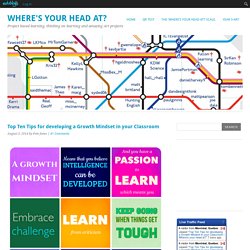
Students should expect and welcome criticism. They must also be given the opportunity to act on any criticism or critique. This will allow students to realise that through improving their work and responding to feedback, they can be better than they were. For this to happen, the culture of improvement needs to feel completely normal.
As teachers, we also need to think about how and when we give feedback. Provide elements of choice. Imagine if every classroom, every teacher instilled this culture within your school. Author: Pete Jones I am primarily an Art teacher, but over the past 5 years have been co-developing an experienced-based learning programme in the school I work in called Pebble, (short for Project Based Learning). Teaching strategies to create 'growth' mindsets. Research has busted the myth that intelligence is fixed and cannot be changed and has put forward a new approach – the growth mindset.
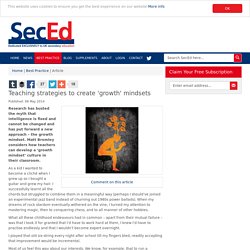
Matt Bromley considers how teachers can develop a ‘growth mindset’ culture in their classroom. As a kid I wanted to become a cliché when I grew up so I bought a guitar and grew my hair. I successfully learnt all the chords but struggled to combine them in a meaningful way (perhaps I should’ve joined an experimental jazz band instead of churning out 1980s power ballads). When my dreams of rock stardom eventually withered on the vine, I turned my attention to mastering magic, then to conquering chess, and to all manner of other hobbies. What all these childhood endeavours had in common – apart from their mutual failure – was that I took it for granted that I’d have to work hard at them, I knew I’d have to practise endlessly and that I wouldn’t become expert overnight. Most of us feel this way about our interests. 1, Use frequent formative feedback. 6 Strategies For Teaching the Growth Mindset. Albert Einstein is considered one of the greatest geniuses of all time, though rumor has it he failed high school calculus.
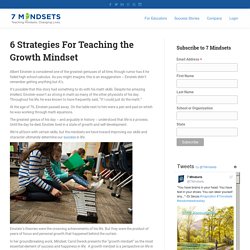
As you might imagine, this is an exaggeration ‒ Einstein didn’t remember getting anything but A’s. It’s possible that this story had something to do with his math skills. Despite his amazing intellect, Einstein wasn’t as strong in math as many of the other physicists of his day. Throughout his life, he was known to have frequently said, “If I could just do the math.” At the age of 76, Einstein passed away. The greatest genius of his day ‒ and arguably in history ‒ understood that life is a process. We’re all born with certain skills, but the mindsets we have toward improving our skills and character ultimately determine our success in life. Einstein’s theories were the crowning achievements of his life.
In her groundbreaking work, Mindset, Carol Dweck presents the “growth mindset” as the most essential element of success and happiness in life. 6 ways to teach growth mindset from day one of school. Imagine if your new class this fall was full of students who would: Be willing to try new thingsStick with hard tasks and not give upPush themselves to do their best work, not just what’s “good enough”Believe in themselves and their own ability to learn Here’s the great news–these are traits that we can help develop in our students by teaching them about how their brains work.
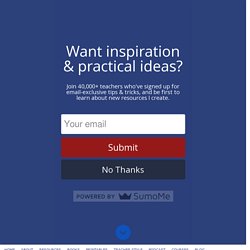
Many students enter our classrooms believing they’re either smart or not smart, good at reading or math, or not good in those areas. This belief that our basic qualities like intelligence and talents can’t be changed is called a fixed mindset. Often our students figure: Why bother trying at something that’s hard for me? Our students may not realize that their brains have the ability to change and grow through their experiences (neuroplasticity). And once they have a growth mindset, they can learn anything. 1. 2. 3. 4. 5. Show students how to respond constructively to setbacks and failures. 6. Carol Dweck 'Mindset - the new psychology of success' at Happiness & Its Causes 2013. Is “Have a Growth Mindset” the New “Just Say No” I’ve been interested in the ideas surrounding the growth mindset prior to it being coined as such by Carol Dweck.
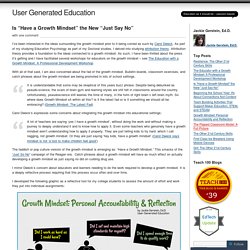
As part of my studying Education Psychology as part of my Doctoral studies, I delved into studying attribution theory. Attribution theory provides a foundation to the ideas connected to a growth mindset. As such, I have been thrilled about the press it’s getting and I have facilitated several workshops for educators on the growth mindset – see The Education with a Growth Mindset: A Professional Development Workshop. With all of that said, I am also concerned about the fad of the growth mindset. Bulletin boards, classroom exercises, and catch phrases about the growth mindset are being promoted in lots of school settings. It is understandable that some may be skeptical of this years buzz phrase.